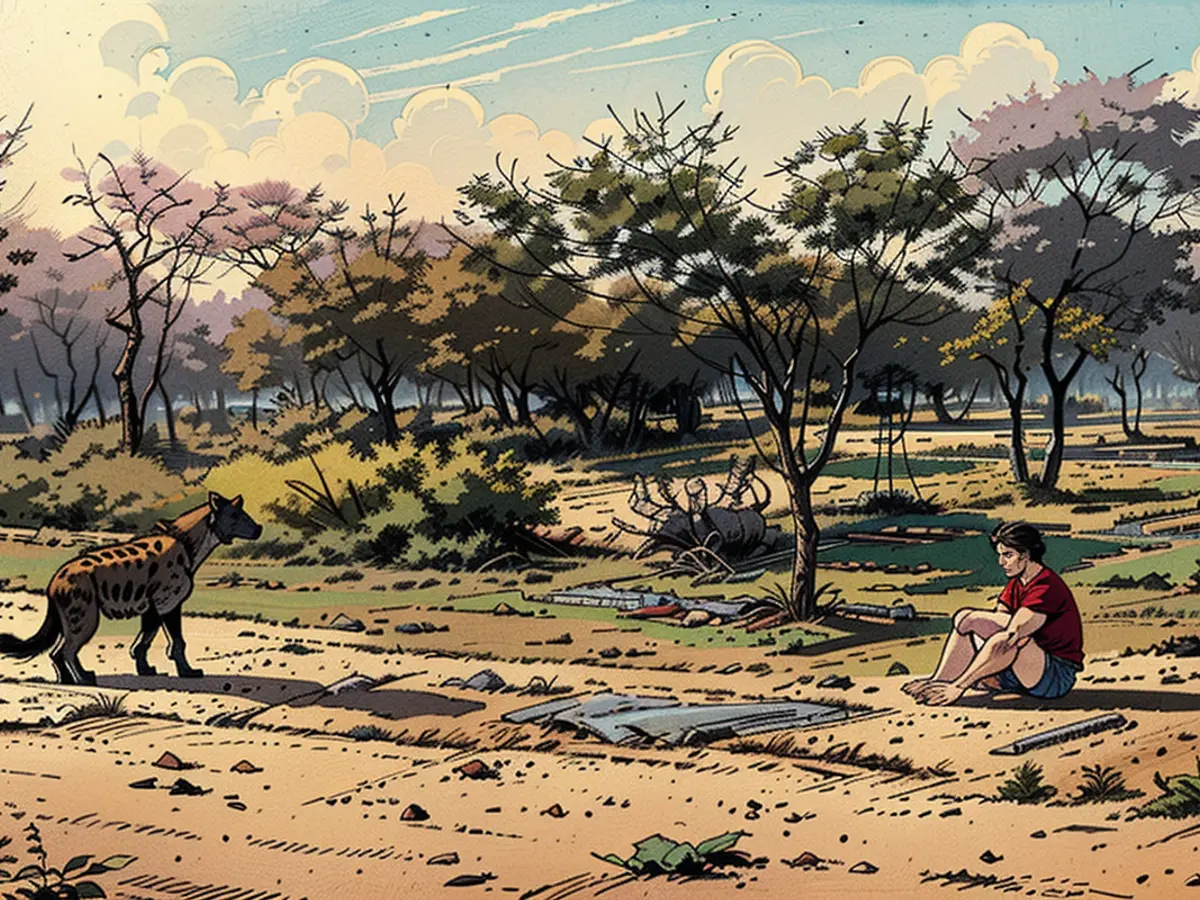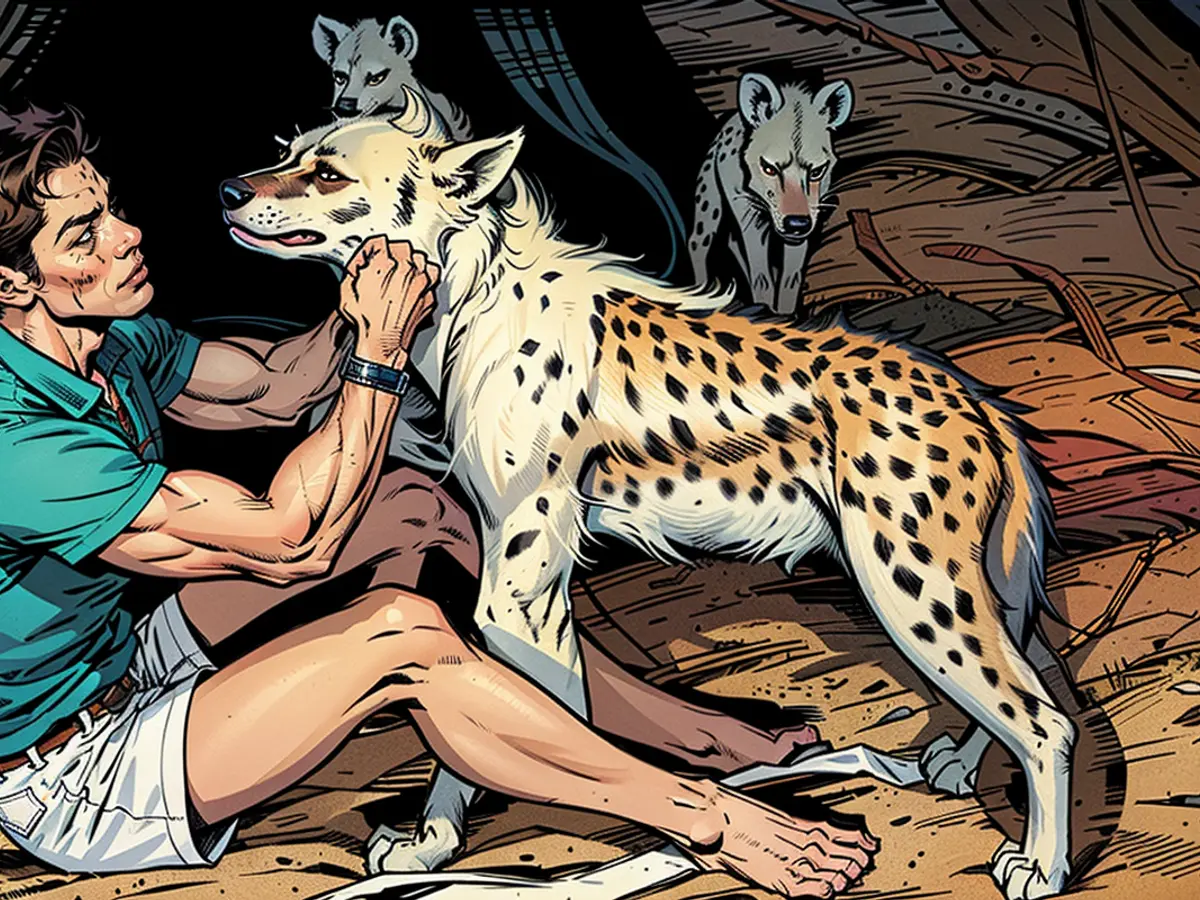Kim serves as a skilled communicator and resonates with hyenas, earning him the title of the "hyena empathizer."
In Disney flicks, hyenas are depicted as malicious, dimwitted, and spineless. However, Kim Wolhuter, a third-generation wildlife guardian, possesses a distinct perspective on these animals. He isn't far from home when he parks his battered Toyota Hilux near a hyena den just past six. The sun has dipped behind the acacias, leaving a fiery ball, the heat of the day gradually fading. Some formidable adults are feeding their offspring before embarking on the night's hunt. The cubs are exploring, frolicking, or quarreling over a twig.
Wolhuter steps out of the car, a couple of buffalo-inflicted wounds reminding passengers of a previous encounter in the driver's side door's sheet metal. He's barefoot, clad simply in a khaki T-shirt and beige shorts. At pitches’ pace, Wolhuter approaches the hyena pack, offering greetings that echo those used in canine communication.
Wolhuter settles down in the sand, and it hardly takes sixty seconds before the first hyena approaches him. Wolhuter reaches out, caressing the predator's neck. Then, Wolhuter lays down on his back, rendering himself absolutely vulnerable. They share affection and playtime, the hyena nibbling gently at Wolhuter's forearm. "Alright, alright," he replies, a softer rebuke one would use to pacify a dog during rough play. Understanding him, the hyena releases its grip. Meanwhile, a babe takes interest in Wolhuter's feet.
Wildlife Guardian
Wolhuter and his family reside in Sango wildlife sanctuary, a part of Save Valley Conservancy, situated in southeastern Zimbabwe. Born with an adoration for wild creatures, this relation to nature was instilled in him at birth. His grandfather, Harry Wolhuter, was the pioneer park ranger in Kruger National Park, South Africa. His father, Henry, followed in his grandfather’s footsteps. Kim Wolhuter spent his early childhood in the African wilderness before starting school.
Wolhuter earned a degree in ecology and initially managed a wildlife farm in Botswana during the 80s. Later, he switched to making international wildlife documentaries. Recreating a close bond with the film subjects was always a priority for Wolhuter, whether that involved leopards, hyenas, cheetahs, or African wild dogs. "I acclimate myself to the animals until they're unfazed by my presence and carry on naturally," says Wolhuter.
Wolhuter is far from a city dweller. He seldom dons footwear except when visiting an administrative building and even then begrudgingly. Night after night, he cruises his 1988 Geländewagen, affectionately named after his mother Joanie, into the wilderness to spend time with animals, sometimes until the early hours of the morning. To accommodate his lifestyle, he's modified his car: where the passenger seat would typically be, there’s a permanently installed mattress, where Wolhuter spends five to six nights per week. His sleep is constricted, but he occasionally dozes off, he admits. Once, he awoke to find a lion scrutinizing him.
Wolhuter's bond with hyenas stretches back over twenty years. At the time, he was working on a National Geographic documentary on the hazardous predators of South Africa's MalaMala game reserve. Wolhuter filmed on his knees to capture a low-angle shot. "Hyenas are highly curious animals. One came to investigate my camera lens. I reached out to pet it," he recalls. He speculated on how the animal would react. Would it sniff, lick, or bite?
But the hyena surprised Wolhuter. It nestled its snout in his palm. Wolhuter began gently scratching its chin. "That was a turning point for me. That hyena taught me the true nature of hyenas," he says. Since then, Wolhuter has befriended hyena packs across four nature reserves in South Africa, Botswana, and Zimbabwe, and has developed close relationships with approximately 20 hyenas. Connection isn't about domestication, he explains. "I present myself to them and observe how they respond."
Each pack and animal is distinct. Some hyenas show little interest in him, while others exhibit curiosity but won't permit physical contact. However, there are some animals that seek and appreciate his physical closeness, according to Wolhuter. This differs from wild dogs or lions, as Wolhuter indicates that they have no interest in direct human contact.
In the Sango reserve, it took approximately six months before the pack embraced his presence, Wolhuter asserts. Initially, the animals would scatter when he exited the vehicle. But, after many sleepless nights laden with patience, they tolerated his presence. "Body language is crucial," he explains. He meets the hyenas at eye level, with confidence but not arrogance. They must not see him as a threat, which is why he doesn't carry weapons. "As soon as people bring weapons, they feel superior, and the animals recognize this immediately," says the 65-year-old.
Hyenas have a sketchy reputation in the animal realm. They're often perceived as shrewd, malicious, dim-witted, cowardly, and foul-smelling scavengers. Disney movies like "The Lion King" have maintained these stereotypes, according to Wolhuter. Furthermore, in several African nations, hyenas are believed to be capable of casting spells on people, acting as a harbinger of misfortune, and bringing misfortune. Wolhuter aims to challenge this notion.
To achieve this, he shares videos on his Instagram account – primarily shot with his phone and a smaller video camera – to give individuals a genuine glimpse into the animal kingdom, "without a script, without hidden agendas, without a predetermined outcome," as Wolhuter describes. His unique bond with the hyenas allows him to capture their lives up close. He intends to demonstrate that hyenas are remarkably intelligent creatures, skillful hunters, and courageous mothers.
"I fully immerse myself within the animals, to the point where I can almost sense what it's like to be that animal. I chase, hunt, and rest alongside the animals," he explains. This familiarity sometimes even opens up new perspectives on the animals' behavior, even astounding science.
Over time, there have been detractors who accuse Wolhuter of meddling with nature. Nevertheless, the explorer debates this criticism by asserting that he neither provides the animals with food nor trains them and does not carry a weapon. "I leave it entirely up to the animals whether they choose to engage with me or not," he says. "We are not separate from nature. We are a part of it. Thus, what I do could not be more organic." Wolhuter derives no financial benefit from his interactions with the hyenas and does not convert them into a tourist site.
Wolhuter is fully aware of the risks associated with his hobby. "Of course, there are times when it becomes quite nerve-wracking," he admits. The inherent predatory instinct and group behavior are deeply ingrained in the animals. "An inappropriate move or misinterpretation could cost me my life."
The following interaction between Kim Wolhuter and the hyena pack challenges the common misconceptions about hyenas' intelligence and behavior, as depicted in Disney flicks. After establishing a connection with the pack, Wolhuter shares his experiences with them on his Instagram account to provide a raw, unscripted view of these animals.
Upon approaching the hyena den, Wolhuter follows a certain etiquette, greeting the animals using canine-like communication and ensuring he does not make any threatening movements or carry weapons, avoiding the animals' perception of superiority.







